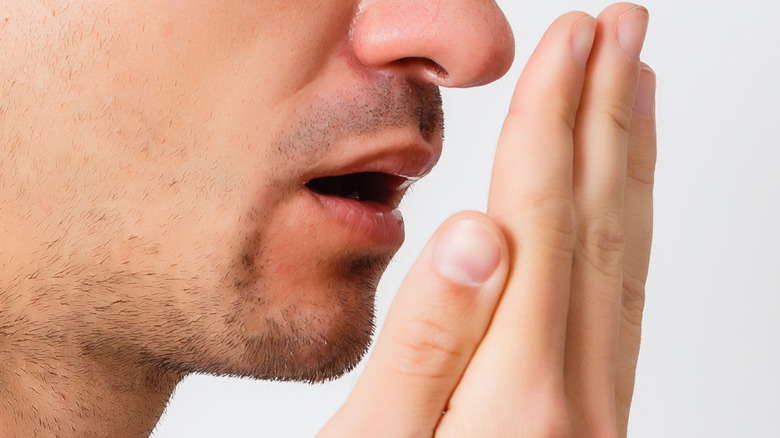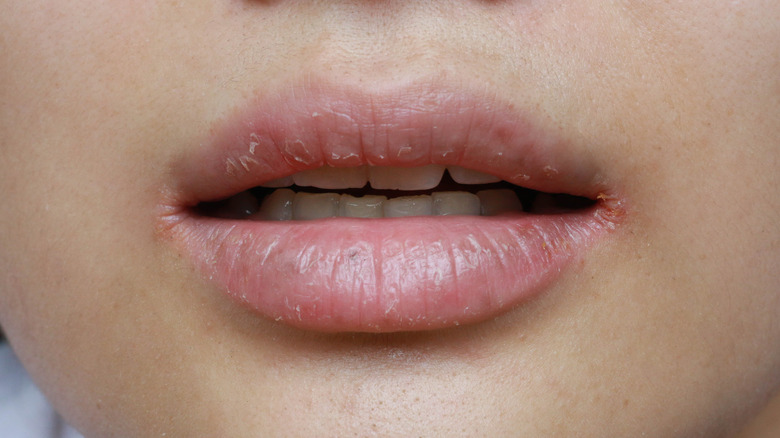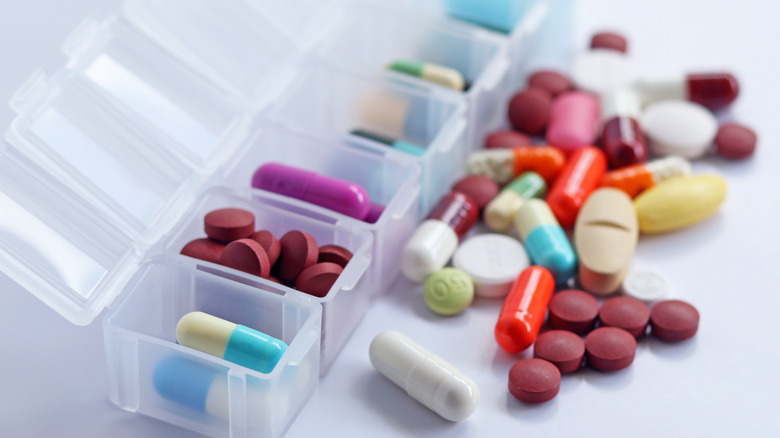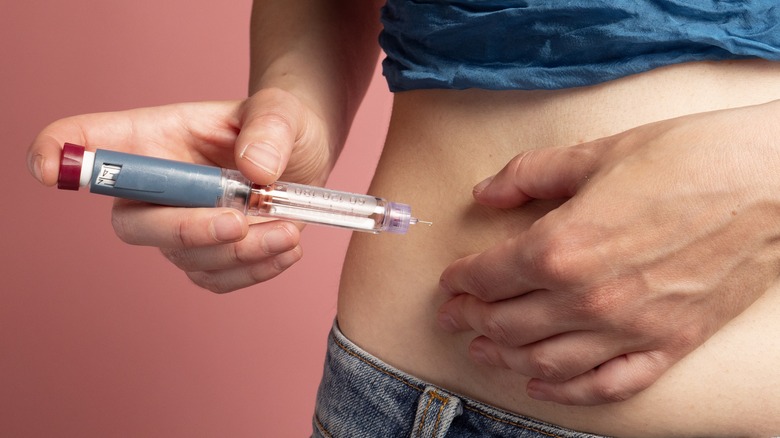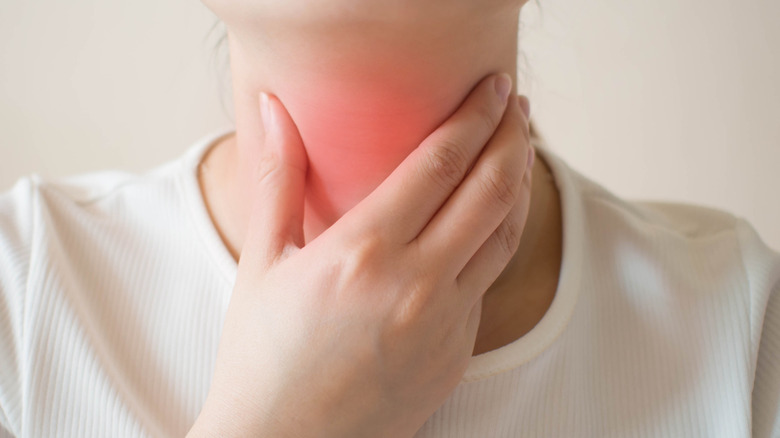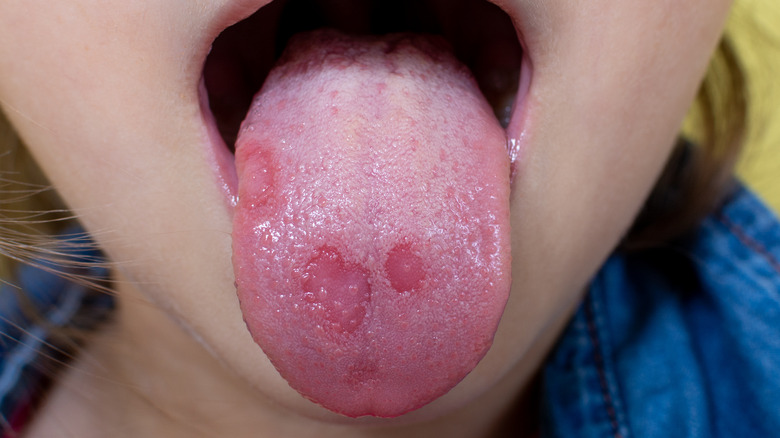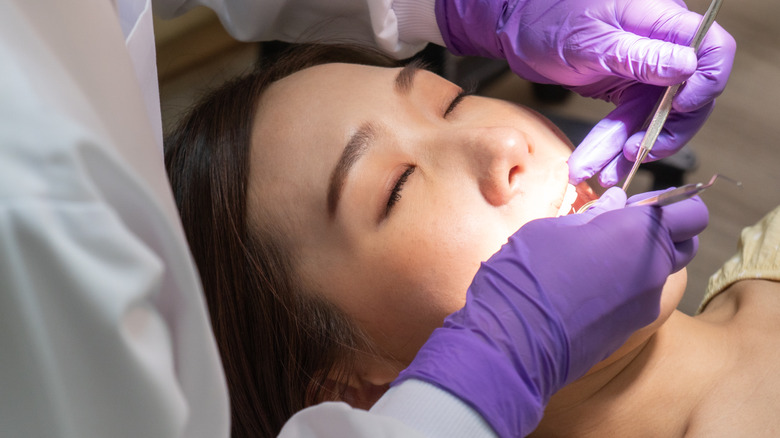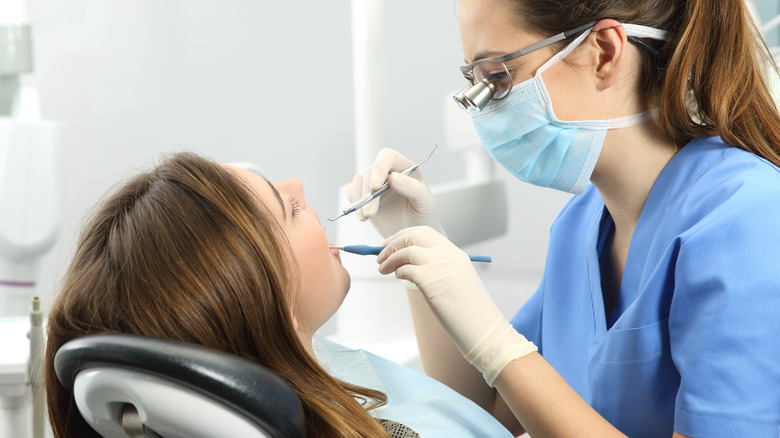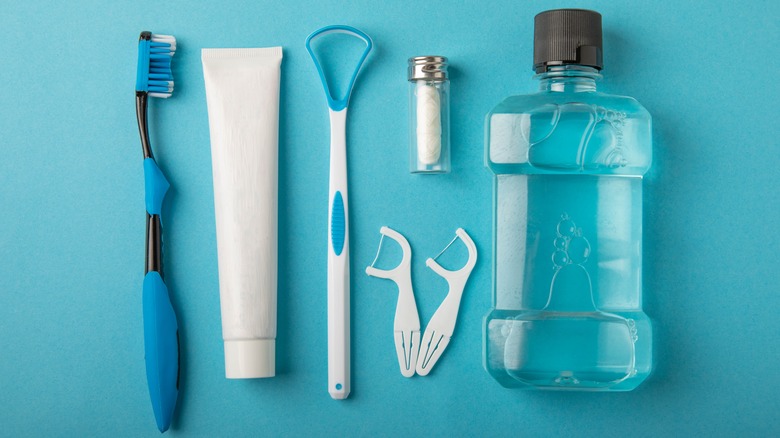Dry Mouth Explained: Causes, Symptoms, And Treatments
Perhaps your mouth feels a bit sticky, your tongue feels like sand paper, or you've been accused of bad breath. If you're experiencing any of these, you may have a condition known as dry mouth. Dry mouth (xerostomia) can affect your lips, tongue, oral cavity, and throat (via the National Institute of Dental and Craniofacial Research). And while it may be a temporary nuisance, a persistent (severe) dry mouth can lead to digestive disorders and nutritional deficiencies (via MedicineNet).
Xerostomia arises when your mouth doesn't produce enough saliva to keep the mouth wet and sufficiently moist (via NIDCR). Remedies for occasional dry mouth may be as simple as cutting caffeine consumption, drinking more water, chewing gum, abstaining from alcohol, and limiting spicy or salty foods. But there may also be underlying medical problems that contribute to dry mouth, including autoimmune disease, diabetes, and nerve damage. Dry mouth may also result from cancer treatment (radiation and chemotherapy).
Dry mouth is not simply a factor of aging, per the NIDCR. However, it may be a common issue among the elderly, as these individuals may suffer from dehydration and long-term health problems that often require multiple medications. It can also be a side effect of certain prescription medications.
Signs and symptoms
If you have a mouth that feels mildly parched or occasionally dry, chapped lips, or even an itchy throat, these may be milder signs of dry mouth (via the Mayo Clinic). At its worst, you may lose your sense of taste and appetite, have difficulty chewing, and maybe even suffer from dysphagia (i.e., difficulty swallowing).
If you tend to be anxious or have difficulty sleeping (i.e., snore or have sleep apnea), you may experience symptoms of dry mouth (via NHS Inform). Breathing from your mouth decreases your salivary production, according to the experts at Manus Dental.
Did you know that saliva is important to help stave off cavities? Thus, inadequate saliva in your mouth may also affect the health of your teeth and gums (per the Mayo Clinic). Other symptoms of dry mouth include halitosis (bad breath), a dry or grooved tongue, recurrent oral infections, and a burning sensation in the mouth (via NHS Inform and the Mayo Clinic).
Causes of dry mouth
Dry mouth can happen when you don't drink enough water or drink a little too much alcohol, per the experts at Executive Home Detox. It can be as simple as being dehydrated. Unsurprisingly, it can also result from long-term alcohol abuse. Interestingly, however, it may also occur during alcohol withdrawal, because the body has adapted to having it in the system. Thus, removing that substance can result in physical symptoms (including dry mouth).
Occasional nerves and stress can dry out your mouth, too (via the National Institute of Dental and Craniofacial Research). And be sure to check those side effects from your medications. Blood pressure mediations, pain medications, and anxiety pills can all contribute to dry mouth (via the Mayo Clinic). Over-the counter drugs such as antihistamines and decongestants can also strip your mouth of the saliva it needs.
And if recovering from or managing a disease isn't enough, dry mouth can certainly manifest from autoimmune disorders like Sjögren's syndrome and HIV/AIDS (via NIDCR). It may also be a complication of diabetes, cancer treatment (i.e., radiation and chemotherapy), and nerve damage to the head or neck. And if you've ever had difficulty controlling acid reflux, you may find yourself braced with a dry mouth and a burning sensation of the tongue (via Healthline).
Risk factors for dry mouth
Your salivary glands can be affected by your lifestyle choices, medications, certain medical treatments, and your hydration status, per the experts at Colgate. Disease processes and implications of advancing age can also contribute to decreased output of saliva. When oral salivary production is too low, it results in dry mouth.
Lifestyle choices that contribute to dry mouth include alcohol use, smoking, and lack of proper hydration. Medical treatments such as chemotherapy and radiation also result in decreased salivary production. Those with diabetes and autoimmune diseases are also at risk for xerostomia. And those that require a higher intake of prescription medications, especially the elderly, are also at heightened risk.
Advancing age is also a consideration for various reasons. Cancer risk is heightened as people age, as Yuma Dental explains. Though rare, nutritional deficiencies for Vitamin A and riboflavin may also put one at risk for dry mouth. It should be noted that the elderly have a harder time meeting nutritional requirements due to lower metabolism and decreased appetite, according to a 2015 review in Current Nutrition Reports. In addition to nutritional status, oral health and hydration may also decline in such individuals, especially those in nursing homes, per a 2002 paper in Qualitative Health Research.
Sleeping with your mouth open
So, you've woken up and your throat is a bit sticky, or your mouth feels arid like a dry, barren desert. Dry mouth upon waking is often a result of sleeping with your mouth open (via Solden Dental Care). You may even be mouth-breathing and unaware of it, because you are sleeping while you're doing it. Nasal allergies are a likely culprit, as whenever your nose is stuffy, you will naturally breathe from your mouth (via WebMD).
If your mouth if chronically dry upon waking, you constantly find yourself fatigued, and/or you've been told you often snore, you may want to see your doctor to rule out nasal obstruction such as enlarged adenoids or sleep apnea. During each episode of sleep apnea, you literally stop breathing. Your brain responds with panic, triggering you to snore as your body gasps to take in air immediately. As a result, you will become more prone to mouth breathing as a means to get in more oxygen.
Dry mouth, diabetes, and kidney disease
There is a connection between dry mouth and diabetes, according to Medical News Today. Dry mouth is a common issue for those with diabetes. Dry mouth may result from common issues diabetics face: dehydration, high blood sugar levels, and kidney issues. Diabetes is the top cause of kidney disease, per the NIDDK. About 33% of adults with diabetes suffer from kidney damage, although it manifests slowly over time.
According to a 2004 paper in Molecular and Cellular Biochemistry, both type I and type II diabetics secrete significantly less saliva than those without blood sugar control issues. Impaired saliva production leads to oral implications, say the researchers. Salivary composition is altered in those with chronic kidney disease, per a 2014 study in the Journal of Renal Care. In a cross-sectional observational study of 30 stage 4 and 5 chronic kidney disease, salivary samples were collected and upper gastrointestinal issues were assessed. 63% of the individuals complained of dry mouth. Lower levels of salivary bicarbonate appeared to be related to dry mouth and dry heaving, while higher levels of calcium bicarbonate had an association with dry mouth sensation.
Dry mouth and autoimmune disease
Dry mouth is one of the two main symptoms of Sjogren's syndrome (via the Mayo Clinic). It is an autoimmune disease in which your immune system attacks your lacrimal (tear) and salivary glands (via MedlinePlus). This means dryness not only in your eyes, but also in your mouth. It also affects various other parts of the body that need moisture. And when it comes to dry mouth, this autoimmune disease can make it difficult to speak, because the mouth may feel as though it's filled with cotton (via the Mayo Clinic). This disease affects up to 1% of the population, and researchers believe it be a combination of genetic and environmental factors including bacterial or viral infections (via MedlinePlus).
HIV is another autoimmune disease in which dry mouth is a common symptom (via Medical News Today). HIV can cause swelling in the salivary glands affecting salivary production. Reduced saliva can trigger various symptoms of dry mouth, including a painful or inflamed tongue, bad breath, and difficulty chewing and swallowing. Dry mouth may also be a side effect of the HIV medications.
Dry mouth and GERD
Frequent acid reflux can cause oral symptoms, including a burning sensation in the mouth or throat and bad breath (via Medical News Today). And while these are also symptoms of dry mouth, research is not conclusive as to whether or not GERD and dry mouth go hand in hand. That said, according to a 2018 study in the Journal of Otolaryngology-ENT Research, excess stomach acid may be more common in people who don't produce enough saliva, including older individuals exposed to advanced diseases such as cardiovascular disease and diabetes. Since saliva has a role in diluting and buffering stomach acid, treating dry mouth may help alleviate symptoms of GERD.
Medications often taken by those with GERD, including over-the-counter and prescription medications, may also lead to dry mouth, as they reduce your saliva production (via Premiere Dental Ohio). These medications may exacerbate symptoms of burning mouth and tongue, both of which are associated with dry mouth.
Stress and anxiety
Breathing through your mouth can lead to symptoms of dry mouth, per the experts at Solden Dental Care. As Healthline explains, shallow breathing through the mouth is more common when a person is anxious. Those experiencing anxiety attacks are also likely to hyperventilate, which is also very drying to the mouth.
According to Calm Clinic, there are several reasons why anxiety causes dry mouth, and mouth-breathing is among them. Other anxiety-related triggers include side effects of common anxiety medications, fluid exchanges in your body due to a "fight and flight" response (which transitions fluids to areas your body feels they are most needed, leaving the mouth more susceptible to dryness), and dehydration. Those who don't drink enough water are more susceptible to severe anxiety, the authors explain.
Lastly, acid reflux also contributes to dry mouth, as it reduces salivary production. Intense anxiety can trigger more acid backup, triggering symptoms of GERD.
Complications of dry mouth
Dry mouth can have implications on your general wellbeing, as well as the health of your teeth and gums (via the Mayo Clinic). That is because saliva has a role in preventing tooth decay, keeping gums healthy, and in your digestive processes, too. It can also impact your speaking, swallowing, and even your enjoyment of food. Difficulty chewing and swallowing may make it hard to meet your nutritional needs.
Dry mouth can be painful and make eating more challenging. Mouth ulcers (i.e., canker sores) appear frequently with dry mouth (via KIN). As salivary production decreases, higher risk for such lesions occur. The tongue can become inflamed as well (via Medical News Today), and met with a burning or tingling sensation, according to a 2014 review in African Health Sciences. Tooth decay and gingivitis are other painful consequences related to dry mouth.
Lack of sufficient saliva can also make the mouth more vulnerable to infections such as oral thrush (a yeast infection). Oral thrush appears as a cottage-cheese-like coating on the tongue, which may be difficult to remove (via Medical News Today). In some cases, bleeding may occur, and the affected area may become sore.
Dental concerns
Dry mouth raises your risk for cavities and gum disease such as gingivitis (via WebMD). Dry mouth may also make it difficult for dentures to fit properly. What's more, it can increase the demineralization of teeth and lead to tooth sensitivity (via the American Dental Association). In particular, patients with dry mouth commonly have dental caries located in the root, between the root and the crown, or in the incisal/cuspal tips. Plaque accumulation and gum infections are also common in those with dry mouth, a manifestation of insufficient saliva.
Saliva is necessary for your oral health, especially when it comes to your teeth and gums. Neutralizing acids in saliva may help prevent tooth decay (via WebMD). With a PH of 6.2-7.6, it has a buffering effect, according to a 2013 article in the Journal of Indian Society of Periodontology. Saliva can also help limit bacterial growth caused by plaque (via Humana). When we chew carbohydrates, they combine with the natural bacteria in your mouth and form acid, which combines with the leftover food bits and saliva that can build up as plaque. It's the bacteria in plaque that leads to tooth decay. Having adequate saliva will help release stray food particles, and keeping up with your brushing and flossing can help remove those leftover bits from your mouth.
When to see a doctor
Whether or not you seek medical treatment for dry mouth will depend on the severity of your condition. Occasional dry mouth can happen to anyone, especially when you are nervous or dehydrated (via NHS Inform). Milder symptoms of dry mouth include a dry feeling in the mouth, chapped or cracked lips, bad breath, and a dry or scratchy throat (via WebMD). But when the condition becomes consistent or more extreme, you may want to check in with your doctor. Difficulties with chewing, swallowing, or even talking can negatively impact a person's quality of life (via MedicineNet). Any type of sores or yeast infections in the mouth and dental issues, such as gum disease and tooth decay, should also be addressed by a medical professional.
Self-remedies for occasional dry mouth may include drinking more water, sucking on lozenges, or chewing gum to stimulate saliva (via NHS Inform). However, if your condition persists, your primary care doctor or oral specialist can prescribe a saliva substitute (such as a spray or lozenge) to keep your mouth moist. In some cases, particularly patients with an underlying history of autoimmune disease, prescription medications to stimulate saliva may be required (via the Mayo Clinic).
How dry mouth is diagnosed
Since dentists are trained to probe the mouth, they will likely detect any issues pertaining to dry mouth long before a patient even knows the condition exists (via the American Academy of Oral Medicine). Lack of enough saliva under and around the tongue is one diagnostic clue, and cavities near the gum line or a fissured tongue can also give them a sense that a person has dry mouth. Common dry mouth complaints range from alterations in one's sense of taste to difficulty swallowing dry food without any liquids.
Your physician also plays a role in assessing your condition. An oral exam, a review of your current medications, and a detailed medical history will help a doctor determine the cause of your dry mouth (via the Mayo Clinic). Blood tests and saliva measurements may be taken. Your doctor may also require image scans of your salivary glands. Additionally, biopsies may be taken from your salivary glands if your doctor suspects you have Sjogren's syndrome.
Treatment for dry mouth
Your doctor will determine the cause of your dry mouth. If he or she believes it is a side effect of any medications you are taking, then he or she will adjust your dosage or switch to another medication that doesn't have a side effect for dry mouth (via NIDCR). Your physician may also prescribe mouth rinses, artificial saliva, and oral lubricants, or recommend over-the-counter options. Artificial saliva typically comes in the form of toothpaste/gel and mouth gel (via WebMD). Xylitol mouth washes can be also effective for dry mouth while protecting against tooth decay. Remember, keeping up with dental hygiene is important.
Dry mouth treatment should be tailored for an individual's needs, according to a review in African Health Sciences. Although there is no one-size-fits-all medical treatment protocol, manual stimulation and topical saliva substitutes can be helpful. Treatment is directed toward palliative care (focused on providing symptom relief and stress relief), especially when dry mouth is part of a serious illness. Consideration of disease prognosis (if medically derived), prescription drugs, and diet are all part of management and care.
Lifestyle and dietary strategies
There are simple lifestyle strategies that can help prevent or soothe dry mouth. According to the experts at Hermosa Dentistry, these strategies include brushing your teeth before bed, staying adequately hydrated, avoiding alcohol and caffeine in the evening, limiting your salt intake, and avoiding spicy foods. Nasal strips at night (to prevent mouth breathing) and oral lubricants may also help. You may also use a humidifier at night (via WebMD).
Sugar-free options for chewing gum or hard candies may help stimulate saliva (via NHS Inform). Sucking on ice cubes will help moisten the mouth. You may rely on artificial saliva or salivary stimulants in the form of sprays or gels as often as needed, before or after meals.
Stay hydrated by sipping water regularly to keep your mouth moist (via WebMD). It's a good practice to include liquid with your meals. Limiting sugary and acidic foods may also help reduce symptoms of dry mouth. And, as always, keep up with your dental appointments.

